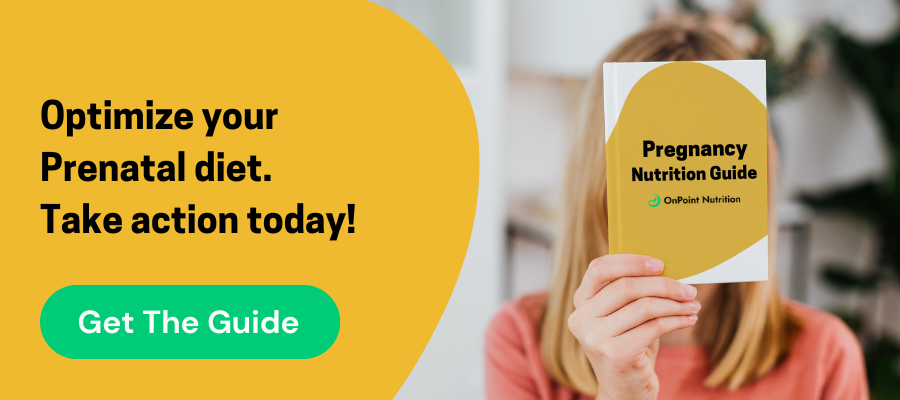
Managing diabetes while you are pregnant (or trying to get pregnant) can be confusing and frustrating. Finding the right guidance and support is important, as it will help you and your baby stay safe and healthy. First, let’s learn a little about diabetes and how it can affect you and your baby.
Diabetes is a condition where your body cannot convert the carbohydrates (sugars and starches) from your food into energy. Your body either makes no/little insulin or cannot use the insulin it makes to change those sugars and starches into energy. This issue results in sugar build-up in your blood. Diabetes falls into three categories: Type 1, Type 2, and Gestational. We will explore the differences between all three and how to manage your treatment while pregnant.
Type 1 & Type 2 Diabetes
With Type 1 diabetes, your pancreas makes little to no insulin. As a result, your body cannot use blood sugar for energy. Therefore, Type 1 diabetics must take daily insulin to control blood sugar levels. With Type 2 diabetes, the body either makes too little insulin or can’t use the insulin it makes to convert blood sugar for energy.
Possible Pregnancy Complications from Diabetes
For pregnant woman with Type 1 or Type 2 Diabetes, poorly controlled blood sugar can lead to problems for both mother and baby. Because your baby’s organs develop during the first two months of pregnancy, congenital disabilities can develop if blood sugars are not controlled during this important time. During the first two months, uncontrolled blood sugar can lead to congenital disabilities of the brain, spine, and heart.
Uncontrolled diabetes can also cause the baby to be “overfed” with extra sugar. This overfeeding may lead to an extra-large baby, causing discomfort for the mom during pregnancy and leading to complications during birth. An extra-large baby usually results in a C-Section, and when a baby is born through C-Section, it can take longer for the mom to recover from childbirth.
High blood pressure is another serious problem that can result from uncontrolled diabetes during pregnancy. High blood pressure can lead to the baby being delivered early and cause seizures or a stroke for mom during labor.
Preterm birth is also a risk in women with Type 1 and Type 2 diabetes, and can lead to breathing problems, heart problems, intestinal and vision problems in the baby.
People with diabetes who take insulin or medications also have a risk of low blood sugar, which can transfer to the baby after birth if not well controlled. Women with uncontrolled Type 1 or Type 2 diabetes are also at risk of miscarriage or stillbirths.
How to manage Type 1 and Type 2 Diabetes During Pregnancy
Plan for pregnancy beforehand, so your doctor can evaluate the effects diabetes has had on your body. Blood sugar control is key, and may include updating your medications. It is important to see your doctor more frequently if you have diabetes and are pregnant. That way, you will prevent and catch problems quickly.
Control your blood sugar through diet and exercise. Eating a balanced diet filled with a mix of complex carbohydrates, lean proteins, healthy fats, fruits, and vegetables will aid in controlling blood sugar. Pair carbohydrates with protein and fat to reduce a high blood sugar spike. Also, eat your starches throughout the day in small amounts to keep blood sugar stable. Along with a balanced diet, try to exercise for at least 30 minutes each day. This exercise can include a brisk walk or light workout.
In addition to diet and exercise, take diabetes medications as directed by your doctor. When taking diabetes medications, you may also be at risk of low blood sugar. Undoubtedly, it is important to control and treat low blood sugar quickly. Keep hard candy or glucose tablets available to correct low blood sugar. You should also consider monitoring your blood sugar to detect changes that can be especially pertinent during pregnancy. Pregnancy changes your body’s energy needs; therefore, blood sugar levels can change quickly.
Gestational Diabetes Causes and Symptoms
Gestational Diabetes is diabetes diagnosed for the first time during pregnancy. Similar to Type 1 and Type 2, Gestational Diabetes affects how your body uses glucose. It causes high blood sugar that can affect mom and baby’s health.
Managing gestational diabetes is similar to managing Type 1 & 2 diabetes while pregnant. Gestational diabetes does not cause noticeable symptoms; common symptoms are increased thirst and more frequent urination. When pregnant, you should get checked for gestational diabetes as part of general prenatal care. If you develop gestational diabetes, schedule frequent checkups with your doctor to monitor your blood sugar and your baby’s health.
Causes of gestation diabetes are not yet fully understood. However, excess weight gain before pregnancy could play a role in its development. Some women have a greater risk of developing gestational diabetes. Risk factors include excess weight gain before pregnancy, lack of physical activity, previous diagnoses of gestational diabetes or prediabetes, PCOS, diabetes in an immediate family member, previously delivering a baby weighing more than nine pounds, and race. Black, Indian, and Asian American women have a higher risk of developing gestational diabetes.
Gestational Diabetes Risks for Baby
Also, gestational diabetes also creates risks for your baby. These risks include excessive birth weight, preterm birth, breathing difficulties, low blood sugar, and stillbirth. Obesity and developing Type 2 diabetes later in life is also higher in babies born from mothers with Gestational Diabetes. Complications that may affect the mom include high blood pressure and preeclampsia, increased risk of getting a C- section, and developing Type 2 diabetes after your baby is born.
What to Do Next
Healthy habits are the key to preventing and managing gestational diabetes. You can help prevent gestational diabetes by eating healthier foods, keeping active, starting pregnancy at a healthy weight, and not gaining excessive weight while you are pregnant.

Topics

Liz has been reading nutrition labels since she learned how to read. Growing up with severe peanut and tree nut allergies she learned that it’s important to know what you are putting into your body. She made her first big lifestyle change as a freshman in high school, when she decided to become a vegetarian. However, it wasn’t until she took a food class in Italy as part of a study abroad program in college that it clicked in her mind that she wanted to make food and nutrition her career. Liz graduated from Penn State University in 2015 with a bachelor's degree in Nutrition, as well as a bachelor's degree in Marketing. She completed her dietetic internship with Aramark in Philadelphia, and her master's degree at Northeastern University shortly after.




